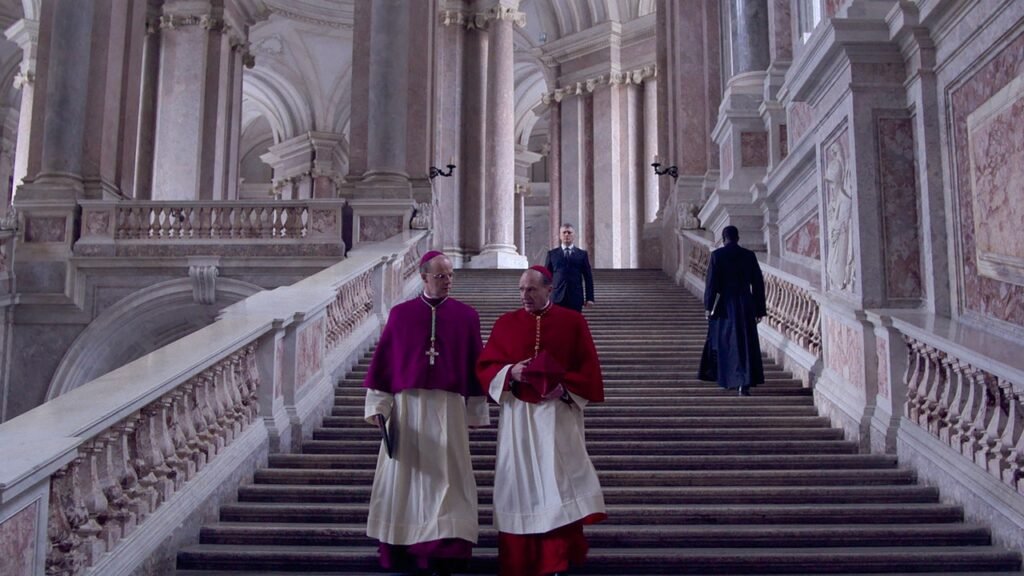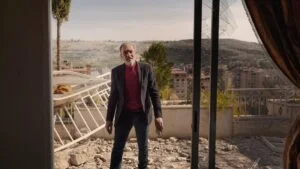“Conclave” Is a Delicate Thriller A couple of Tense Papal Election

A reformist Pope who boldly leads the Catholic Church into controversial adjustments ought to be performed by an actor of commanding presence. In “Conclave,” there may be such a Pope—he’s seen early within the movie and he’s the very reason behind the drama—however he’s performed by an actor, Bruno Novelli, with no different credit and no distinctive display screen aura. The function is a really troublesome one: when the motion begins, that Pope is useless, and the actor has nothing to do however lie nonetheless. All of the extra motive that this character, who, even in loss of life, exerts a robust grip over his followers and allies, ought to be performed by a global star of irrepressible charisma—a high quality with spiritual connotations—in order that the very sight of him, nonetheless transient, conjures up awe.
This may appear a small matter of casting, however it typifies what this film lacks. Its plot is as intelligent as its creativeness is stolid, its topics are as critical as its strategy to them is bland. Tailored from a novel by Robert Harris, “Conclave” is a talk-driven thriller that takes place within the Vatican because the School of Cardinals assembles to elect a brand new Pope. The administration of the papal election falls to Cardinal Thomas Lawrence (Ralph Fiennes), the reform-minded Dean of the School of Cardinals, who can be an in depth pal of the late Pope’s shut affiliate and Secretary of State, Cardinal Aldo Bellini (Stanley Tucci), a tart-tongued liberal of excessive precept and the pure successor to the papacy. However different cardinals have been politicking for the workplace, together with a Nigerian cardinal, Joshua Adeyemi (Lucian Msamati), whose hostility to homosexuality rankles the liberals; Goffredo Tedesco (Sergio Castellitto), an open reactionary who inveighs loudly in opposition to fashionable freedoms and desires to revive the Latin Mass; and Joseph Tremblay (John Lithgow), the late Pope’s chosen Camerlengo, or chamberlain, a seemingly evenhanded bureaucrat who, in fulfilling his accountability for saying the loss of life of the Pope, has accomplished so in ways in which arouse suspicion.
Because of Lawrence’s reformist preferences and private loyalties, his administration of the method proves to be greater than merely ceremonial or administrative. The drama is anchored by the voting itself—the frilly formalities with which the cardinal electors, of whom (in actual life) there are 100 and twenty-one, forged their ballots, requiring a two-thirds vote to yield a winner. The voting takes place within the titular conclave, the etymology of which suggests “with a key” and suggests the circumstances underneath which the election is held. The cardinals are secluded in hotel-like quarters within the Vatican and sequestered like jurors in newsy trials—insulated from all outdoors media. The likeliest candidates, none of whom prevails on the extensively cut up first poll, actively marketing campaign, and Lawrence finds himself enmeshed in politicking, searching for first to advertise Bellini after which, as assist for Bellini dwindles, to type a coalition to maintain Tedesco out.
The drama pivots on conflicts between sworn duties and ethical duties, between adherence to guidelines and constancy to a better regulation. As with many elections, this one has its personal variations of October surprises, and its looming scandals contain the identical issues that roil secular politics—intercourse and cash. The distinction is that, removed from being inspired to convey such issues to gentle, Lawrence is certain by the media insulation of the conclave to not examine the premise of suspicions. However hints of bother attain so far as the nuns who workers the Vatican; one particularly (performed by Isabella Rossellini) is paying shut consideration. There’s one other shock when a brand new cardinal whom no person knew about, Vincent Benitez (Carlos Diehz), exhibits up on the final minute. Benitez is the Archbishop of Kabul, and the late Pope had appointed him in pectore—that’s, in secret—a tactic doubtless used to guard him from persecution. He bears a letter of unimpeachable authority testifying to his nomination, and his mysterious presence turns into a topic of his colleagues’ rising fascination.
In filming “Conclave,” Edward Berger (working with a script by Peter Straughan) gives piquant glances on the elaborate Vatican rituals, such because the sealing of the late Pope’s door with wax, the old style paper votes positioned on a plate and tipped right into a receptacle, and the mechanics of producing white and black smoke as a sign to Vatican-watchers. Berger clearly relishes displaying the fabric and procedural arcana of the Holy See, together with the Vatican’s magnificent settings, however he does so with an ahistorical incuriosity—with the anecdotal picturesqueness of a travelogue. The drama, in fact, hinges on how all of the coalitions and the maneuvers will shake out and who will finally be elected. The inconclusive first poll hints on the many rounds that can be wanted. And, though anybody who has seen “Twelve Indignant Males” is aware of how such a plot works, the suspense that arises because the backroom intrigues develop ever extra ferocious and the schemes ever bolder is efficient, if simplistic.
The filmmaking retains a gradual, methodical placidity all through—to match the plainness of every thing however the suspense. Berger delights in displaying the ordinariness of the cardinals’ extraordinary duties, in presenting the incense-shrouded mysteries of faith as a professionalized and rigorously sensible realm, whose highest representatives are as hard-nosed and worldly as secular politicians. This delicate skepticism, nonetheless, is in battle with the story itself, which finally suggests—considerably deferentially—that some non secular illumination guides those that’ve made souls their enterprise. This noteworthy assertion makes it all of the extra disheartening that, in a film involving coalition-building and the altering of hearts and minds, hardly any of the run time is dedicated to discussions among the many many cardinals, outdoors the interior circle of officers and candidates, concerning the choices at hand and what they give thought to them.
Much more essential, the narrative’s creamy attraction neuters the larger issues that the film evokes: crises of religion. It’s the smoldering core of the motion, disclosed in a number of beats of dialogue, and enfolded in a homily—and a couple of character, the film suggests, could suffer from such basic doubts. The uncooked materials of “Conclave” approaches the grandeur of the basic spiritual cinema, whether or not the non secular severity of Dreyer or Rossellini or Bergman, or the anticlerical fury of Buñuel or Pasolini, however Berger movies like a vacationer. The superficial therapy of the film’s sterner themes doesn’t assist its splendid forged. Fiennes and Tucci, particularly, spin dialogue with athletic deftness, however they and the remainder of the forged are burdened with embodying inventory characters who exist solely by means of a salient trait or two. As a substitute of rising to the awe-inspiring heights of their settings, the refinement of the performances is narrowed to monotony. ♦





